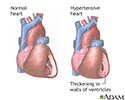Hypertensive heart disease
Hypertension - hypertensive heart; High blood pressure - hypertensive heart
Hypertensive heart disease refers to heart problems that occur because of high blood pressure that is present over a long time.
Causes
High blood pressure means the pressure inside the blood vessels (called arteries) is too high. As the heart pumps against this pressure, it must work harder. Over time, this causes the heart muscle to thicken.
Because there are often no symptoms with high blood pressure, people can have the problem without knowing it. Symptoms most often do not occur until after many years of poor blood pressure control, when damage to the heart has occurred.
Without treatment of high blood pressure, symptoms of heart failure may develop. Sometimes, the muscle can be so thick that it does not get enough oxygen. This can cause angina (chest pain).
Heart failure
Heart failure is a condition in which the heart is no longer able to pump oxygen-rich blood to the rest of the body efficiently. This causes symptom...

Muscle can be so thick
Hypertrophic cardiomyopathy (HCM) is a condition in which the heart muscle becomes thick. Often, only 1 part of the heart is thicker than the other ...

Angina
Angina is a type of chest discomfort or pain due to poor blood flow through the blood vessels (coronary vessels) of the heart muscle (myocardium). Th...
High blood pressure also leads to thickening of the blood vessel walls. When combined with cholesterol deposits in the blood vessels, the risk of heart attack and stroke increases.
Hypertensive heart disease is the leading cause of illness and death from high blood pressure.
When to Contact a Medical Professional
Call your health care provider if you have high blood pressure and develop any symptoms.
Prevention
Diagnosing high blood pressure early can help prevent heart disease, stroke, eye problems, and chronic kidney disease.
All adults (aged 18 years and older) should have their blood pressure checked:
- Once a year for adults age 40 years and older
- Once a year for people at increased risk for high blood pressure
- Every 3 to 5 years, adults ages 18 to 39 years with blood pressure less than 130/85 who do not have other risk factors.
People with high-normal blood pressure (130-139/85-89 mm Hg) who may be at increased risk are those who are overweight or obese, and African Americans.
Your health care provider may recommend more frequent screenings based on your blood pressure levels and other health conditions.
If your blood pressure is high, you need to lower it and keep it under control.
- Do not stop or change high blood pressure medicines without talking to your provider.
- Carefully control diabetes and high cholesterol.
References
O'Connor CM, Rogers JG. Heart failure: pathophysiology and diagnosis. In: Goldman L, Schafer AI, eds. Goldman's Cecil Medicine . 25th ed. Philadelphia, PA: Elsevier Saunders; 2016:chap 58.
Siu AL, the U.S. Preventive Services Task Force. Screening for high blood pressure in adults: U.S. Preventive Services Task Force recommendation statement. Ann Intern Med. 2015;163:778-786. PMID: 26458123 www.ncbi.nlm.nih.gov/pubmed/26458123 .
Victor RG. Arterial hypertension. In: Goldman L, Schafer AI, eds. Goldman's Cecil Medicine . 25th ed. Philadelphia, PA: Elsevier Saunders; 2016:chap 67.
Victor RG. Systemic hypertension mechanisms and diagnosis. In: Mann DL, Zipes DP, Libby P, Bonow RO, Braunwald E, eds. Braunwald's Heart Disease: A Textbook of Cardiovascular Medicine . 10th ed. Philadelphia, PA: Elsevier Saunders; 2015:chap 43.
-
Cardiac hypertension hypertrophy
Animation
-
Hypertension - illustration
Hypertension is a disorder characterized by consistently high blood pressure. Generally, high blood pressure consists of systolic blood pressure (the top number, which represents the pressure generated when the heart beats) higher than 140, or diastolic blood pressure (the bottom number, which represents the pressure in the vessels when the heart is at rest) over 90.
Hypertension
illustration
-
Lifestyle changes - illustration
Hypertension is a disorder characterized by chronically high blood pressure. It must be monitored, treated and controlled by medicines, lifestyle changes, or a combination of both.
Lifestyle changes
illustration
-
Hypertension - illustration
Hypertension is a disorder characterized by consistently high blood pressure. Generally, high blood pressure consists of systolic blood pressure (the top number, which represents the pressure generated when the heart beats) higher than 140, or diastolic blood pressure (the bottom number, which represents the pressure in the vessels when the heart is at rest) over 90.
Hypertension
illustration
-
Lifestyle changes - illustration
Hypertension is a disorder characterized by chronically high blood pressure. It must be monitored, treated and controlled by medicines, lifestyle changes, or a combination of both.
Lifestyle changes
illustration
-
Heart attack and acute coronary syndrome
(In-Depth)
-
Heart failure
(Alt. Medicine)
-
Atherosclerosis
(Alt. Medicine)
-
High blood pressure
(In-Depth)
-
Diabetes - type 2
(In-Depth)
-
Hypercholesterolemia
(Alt. Medicine)
-
Diabetes - type 1
(In-Depth)
-
Magnesium
(Alt. Medicine)
-
Pulmonary hypertension
(Alt. Medicine)
-
High blood pressure
(Alt. Medicine)
Review Date: 2/24/2016
Reviewed By: Michael A. Chen, MD, PhD, Associate Professor of Medicine, Division of Cardiology, Harborview Medical Center, University of Washington Medical School, Seattle, WA. Also reviewed by David Zieve, MD, MHA, Isla Ogilvie, PhD, and the A.D.A.M. Editorial team.




